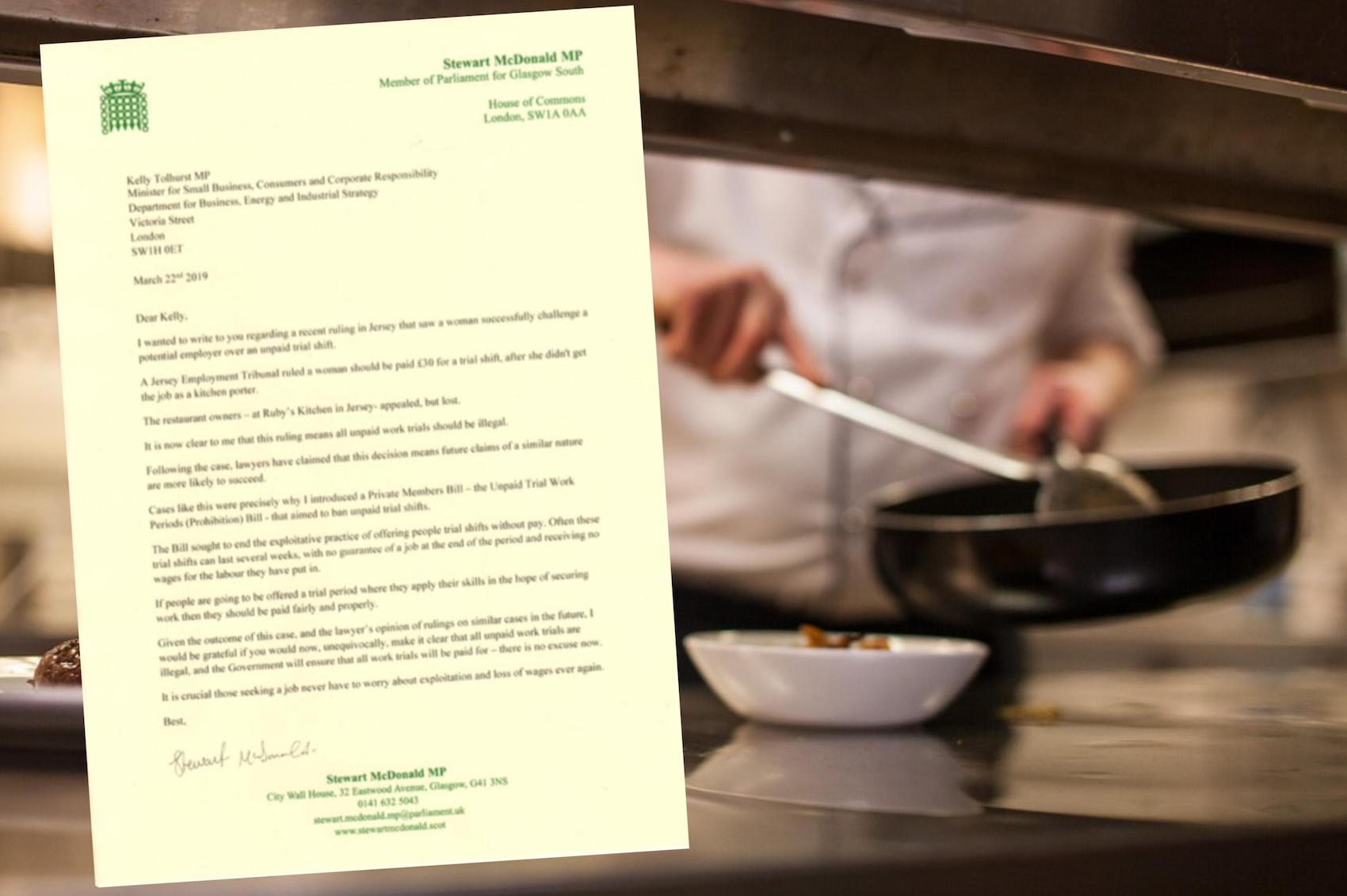

An MP is using the example of a Jersey restaurant ordered to pay £30 to a failed kitchen job candidate after a three-hour trial shift to bolster his fight to illegalise the ‘exploitative’ practice in the UK.
Stewart McDonald MP – an SNP representative for Glasgow South – has written to the UK Minister for Small Business, maintaining that there is “no excuse” for those that undertake ‘trial’ work to be paid, following the example of Ruby’s Lounge and Bistro in Jersey.
As originally reported in Express, the cabaret-themed restaurant originally declined to pay a kitchen job candidate for her three-hour shift, arguing that it was not “normal” in the catering trade to pay prospective staff for a “trial”.
However, when the unsuccessful applicant took her case to the Employment Tribunal, they found against this. Ruby’s then appealed the judgment, but had it rejected.
Mr McDonald is claiming that, although Jersey and the UK are governed by separate laws, the Jersey case should set a precedent for the UK to follow.

Pictured: Stewart McDonald MP's letter to the Minister.
In his letter to Minister for Small Business, Kelly Tolhurst MP, which Mr McDonald has shared with Express, he argues: “If people are going to be offered a trial period where they apply their skills in the hope of securing work then they should be paid fairly and properly.
“Given the outcome of this case… I would be grateful if you would now, unequivocally, make it clear that all unpaid work trials are illegal, and that the Government will ensure that all work trials will be paid for – there is no excuse now.
“It is crucial those seeking a job never have to worry about the exploitation and loss of wages ever again.”
Raising the case of Ruby’s Lounge and Bistro with the Minister is the latest step in a long-running battle by the MP to have all shifts – regardless of whether for ‘trial’ work – to be paid at least at minimum wage.
He brought a Private Members Bill on the matter in a bid to end the practice, but it was talked out, meaning that unpaid trial shifts remain legal.
In Jersey, however, this is not the case. Anyone who carries out work for another person is deemed an ‘employee’ under the island’s employment law, meaning that – regardless of whether there is a written, verbal or simply implied contract – they have the right to be paid for their labour.
“Jersey’s Employment Law says employees must be paid at a rate which is at least the minimum wage. The law provides a lower trainee rate per hour (where the employer meets certain conditions) but there is no exception in the law that would allow for unpaid trial periods,” a Government of Jersey spokesperson confirmed.
Unpaid work trials latest: SNP MP calls for full ban on unpaid work trials following Jersey ruling https://t.co/triMgp3Iq5
— Stewart McDonald MP (@StewartMcDonald) March 24, 2019
However, it appears there’s growing support for making that fact clearer.
Numerous islanders have shared stories of having carried out ‘trial’ work without being paid, particularly in drinking and dining establishments on the island.
One case involved a 17-year-old boy, who applied for a position at a coastal café he had spotted on the gov.je website. He was asked to work a three-hour trial, but, when his mother called at 12:00, she learned that he had been asked to work – for free – until the end of the day.
The islander that shared the experience said they were aware of other teenagers who had undergone the same, fearing that young people are particularly targeted as they might be “naïve, having just entered the workplace from school/college”.
Other islanders commented that the practice was “normal” in the hospitality industry.
Express approached the island’s two largest pub chains - Randalls and the Liberation Group - for their views on the matter.

Pictured: Gavin Reid, CEO of Randalls, said that his pub chain does not engage in the practice and supports 'trial' shift workers being paid.
Chief Executive Officer of Randalls, Gavin Reid, told Express: “Randalls have never engaged in the practice of unpaid shifts. As far as I am aware, in order to engage someone in employment then a contract of employment needs to be in place, and this can be either verbal or written (if the employment is for 8 hours or more per week).
“Whenever an individual starts work then this contractually means we have agreed to pay someone at specific hourly rate. As this is something Randalls already adheres to in paying their employees quite rightly for the hours they have worked, then I would have no objection to any legislation ruling this kind of practice out.”
Liberation Group declined to comment.
Campaign Group ‘Say No To Unpaid Trial Shifts’ told Express it hoped the UK would learn from Jersey’s position: “[We] welcome the findings of the this employment tribunal, which makes it clear that those undertaking trial shifts should be paid for their work. As Ms De Sousa‘s case makes clear, trial shifts of any length deserve payment for the hard work of potential candidates.
"Unsuccessful candidates, having worked for a number of hours providing revenue for the business, deserve to be paid for their time and services. We hope the UK government will pay close attention to this ruling when considering our arguments to unequivocally ban unpaid trial shifts."
It's 2019. It's time to end #UnpaidTrialShifts. @StewartMcDonald
— Say No To Unpaid Trial Shifts (@NoUnpaid) March 17, 2019
Learn more pic.twitter.com/4XwmKDOv4w
Express has contacted the Jersey Hospitality Association for comment and is awaiting a response.
Comments
Comments on this story express the views of the commentator only, not Bailiwick Publishing. We are unable to guarantee the accuracy of any of those comments.